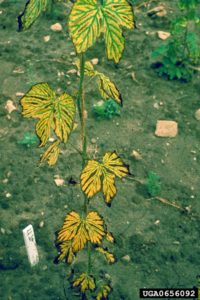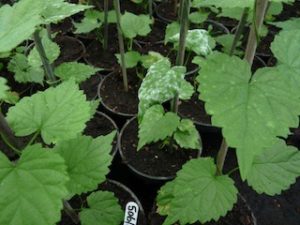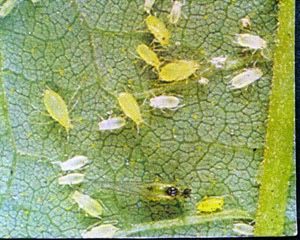Hop plants may be cropped for over 20 years, so it is important that the original planting is free from debilitating virus and viroid disease (some of them symptomless). Specialist hop propagators, located outside the main hop growing regions, supply certified disease free stock under an official approval scheme.
Today there is a new threat to British hops coming from overseas. It is Hop Stunt Viroid which is active in the USA and Asia. It is important that all hop plants grown in Britain come from PHPS registered nurseries (these are regulated by Plant Health officials). If Hop Stunt Viroid was introduced into the UK it would devastate the industry. So if you are seeking any variety, British or otherwise to grow in your garden, brewery or back yards, please make sure that you use a reputable source. If you are in any doubt, please speak to Peter Darby at Wye Hops. And please don’t risk bringing plant material back from an overseas trip into Britain.
The common pests and diseases of British Hops include:
Verticillium Wilt

Hops are vulnerable to infection by the soil-borne disease Verticillium Wilt against which chemical treatments are impractical. Strict hygiene is necessary to minimise the likelihood of introducing this disease into hop plantings. Verticillium wilt first appeared in the UK in the 1920’s and was recognised in continental Europe in the 1950’s. Plants infected with Verticillium Wilt must be grubbed-out and the site of infection laid fallow under a weed-free grass cover for several years. Again, plant breeding has produced British hop varieties that are resistant to, or tolerant of, infection by this disease.
Here in Britain it means that we avoid cultivation and moving soil around, and as a consequence have permanent screw pegs and can string continuously from the ground – aspects of our hop growing that always interest visitors from overseas. It also determines which varieties can be grown at certain sites. The control measures against wilt are a very high priority in Britain and our control measures include the non-cultivation of hop plantings and the planting of certified wilt-free stocks.
Powdery & Downy Mildews
 During the course of a growing season, the crop is susceptible to infection by several fungal diseases. Any shoots showing obvious symptoms of disease are removed during the rounds of training. For susceptible varieties, frequent applications of fungicidal sprays may be needed against hop powdery and downy mildews. Many of the modern hop varieties have been bred with resistance to either one or both of these diseases.
During the course of a growing season, the crop is susceptible to infection by several fungal diseases. Any shoots showing obvious symptoms of disease are removed during the rounds of training. For susceptible varieties, frequent applications of fungicidal sprays may be needed against hop powdery and downy mildews. Many of the modern hop varieties have been bred with resistance to either one or both of these diseases.
Aphids and Spider Mite

Hops are also susceptible to attack by several important pests. The damson-hop aphid and two-spotted spider mite can devastate hop crops. Boadicea is resistant to aphid and lots of work is being done to develop further aphid resistant varieties. For susceptible varieties, control of aphids is essential every year. Outbreaks of the two-spotted spider mite occur more sporadically than those of the aphid. Hedgerow hops and conventional varieties on low-trellis are more susceptible to damage by mites than those grown on high wirework. Although most hop growers continue to rely on pesticides for control of pest mites, biological control using releases of predatory mites is effective on hedgerow hops. Other pests, particularly caterpillars, are becoming increasingly common following the phasing out of organophosphorus and pyrethroid insecticides.
Organic Hops
Growing organic hops in the UK is more of a challenge. They are kept healthy by maintaining the soil in the best condition possible and not encouraging excessive growth in the plant. Organic hops are surrounded by weeds which provide a vital habitat for aphid and red spider eating predators, whilst at the same time reducing the yield as plant and weed are all sharing the same nutrients. The major challenges are the number and timing of the Damson Hop aphid and the season.


